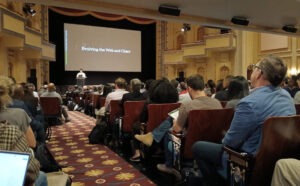New CEO comes to helm as companies like Google, Meta, and TikTok pull out of the Lisbon-based mega-conference in response to accusations from the event’s founder and former CEO that Israel is committing “war crimes.”

You might have heard that Web Summit, the titanic tech conference that’s held each year in Lisbon, Portugal, is in danger of crashing and burning after the event’s co-founder and long-time CEO, Paddy Cosgrave, made some statements on Twitter/X in the wake of Israel’s response to Hamas’s October 7 attack, that led to a mass exodus by the event’s biggest sponsors as well as many scheduled speakers. As a result, Cosgrave resigned as CEO on October 21, and on Monday Katherine Maher, the CEO and executive director of Wikimedia Foundation from 2019 to 2021, was crowned as the organization’s new CEO.
Maher announced her new role in a video on YouTube, just two weeks before the conference is scheduled to open the doors on its 2023 run.
“I worked with one of the largest and most diverse technology communities in the world as CEO of Wikimedia, and now I’m incredibly excited to work alongside the Web Summit team in your global community,” she said. “Web Summit gathers and connects thousands of innovators from every corner of the world. And, as with every year, brings important voices and conversations to the stage. Through this connection and conversation we enable the dialogue on how technology shapes our lives and the world around us. I look forward to seeing you soon in Lisbon.”
Although Maher didn’t mention the controversy currently surrounding the event in the video, in an open letter she penned and published later Monday on Web Summit’s website, she addressed the issue directly after spending a few paragraphs emphasizing the event’s 14 year history:
“If you’re reading this, though, you’re undoubtedly aware that in recent weeks Web Summit has been at the center of the conversation, rather than the host. Its purpose was overshadowed by the personal comments of the event’s founder and former CEO, Paddy Cosgrave. Paddy has apologized and stepped down from Web Summit; you can read his statement here.
“Today Web Summit is entering its next phase. I am excited to announce that I am joining Web Summit as CEO, because I believe in Web Summit’s mission to connect people and ideas that change the world. Our immediate task at hand is returning the focus to what we do best: facilitating discussions among everyone involved in technological progress.”
This is a big ship she’s tasked with rescuing. Last year Web Summit played host to 71,000 attendees, which puts it in the same league as the world’s largest tech event, CES, which last year drew a crowd of 115,000. She also doesn’t have much time. As I mentioned, the event is scheduled to take place in less than two weeks, on November 13-16.
What Did Cosgrave Say?
Actually, unless there’s some history here that I’ve been unable to find, the gist of what Cosgrave said (that the wholesale bombing of innocent Palestinians is wrong) was acceptable. It was the wording that offended a lot of people (and from a purely logistical standpoint, it was probably a little early in the game to be calling the Netanyahu administration out for war crimes).
Here’s what Cosgrave tweeted to his 91,000 followers on X:
“War crimes are war crimes even when committed by allies, and should be called out for what they are.”
Whether too early or too late, the Israeli government certainly didn’t like the post. Within hours of its going up, Dor Shapiro, Israel’s ambassador to Portugal was making noise on LinkedIn:
“Today, I wrote to the Mayor of Lisbon informing him that Israel will not participate in the #WebSummit conference due to the outrageous statements made by the conference CEO Paddy Cosgrave. Even during these difficult times, he is unable to set aside his extreme political views and denounce the Hamas terrorist activities against innocent people. Dozens of companies have already canceled their participation in this conference, and we encourage more to do so.
“We should have zero tolerance to terrorist and terror acts!”
Another problem was that Cosgrave wasn’t evenhanded with his lambasting, since he didn’t mention that Israel was responding to a bone fide atrocity committed against its people. This is something that the co-founder and co-CEO of Tel Aviv-based natural language processing company AI21 Labs, Ori Goshen pointed out, also on LinkedIn:
“In a month I was supposed to give a keynote at Web Summit Lisbon. I will not.”
“It’s bad enough that summit CEO Paddy Cosgrave didn’t see fit to express horror at the sickening atrocities committed by Hamas on October 7th.
“But as immoral as that is, Paddy Cosgrave chose to not only ignore these but instead post something against the policies of the Israeli government. Leaving aside his very partial understanding of history and geopolitics, this response was abhorrent.
“We at AI21 cannot be part of such indecency and moral bankruptcy. We will not attend WebSummit, and I will not give the keynote.”
Adding fuel to the fire, Cosgrave posted his anti-Israel rant from Doha, Qatar, where another Web Summit is scheduled to launch in February. Qatar is thought by some to be a funding source for Hamas.
Also, in subsequent posts, he cherry-picked casualty figures to make it appear that even more Palestinians were dying compared to Israelis than is factual.
Organizations cancelling includes Google/Alphabet, Meta, Intel, Amazon, Stripe, Amazon, TikTok, and more. Also gone are a sizable number of people who were slated to speak or give presentations. Among others, that list includes Garry Tan, president of Y Combinator, and Nadav Shoval, founder and CEO at the social engagement platform OpenWeb.
How Bad Is It for Web Summit?
The Web Summit organization is obviously hoping that with Cosgrave gone the new CEO will be able to wave a wand and bring everyone who’s cancelled back into the fold, but there’s probably not enough time for that. Even if given more time, there’s another elephant in the room that makes it unlikely that Maher would be able to get enough organizations to change their mind to make much of a difference at this year’s event.
The elephant is Cosgrave’s likely majority ownership of Web Summit, which means he would still profit from a successful conference, and a lot of people are mad as hell at Cosgrave and don’t want to put a single nickle in his pockets. The New York Times reports that according to company filings in Ireland, that as recently as last summer Cosgrave owned 81 percent of the conference, although the paper indicates that its been unable to determine his current ownership status.
The blowback is also already affecting other events that Web Summit hosts. For example, February’s separate Web Summit in Qatar has sponsors and speakers backing out according to Toronto’s Globe and Mail.
Christine Hall has been a journalist since 1971. In 2001, she began writing a weekly consumer computer column and started covering Linux and FOSS in 2002 after making the switch to GNU/Linux. Follow her on Twitter: @BrideOfLinux







